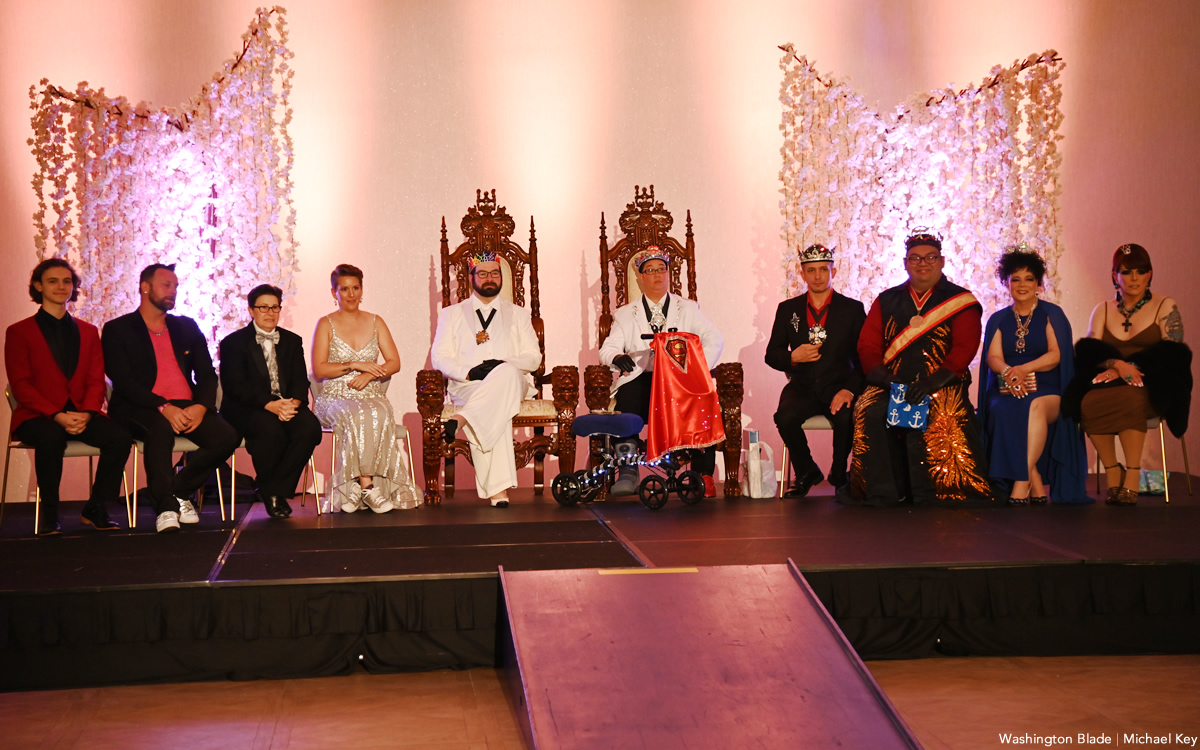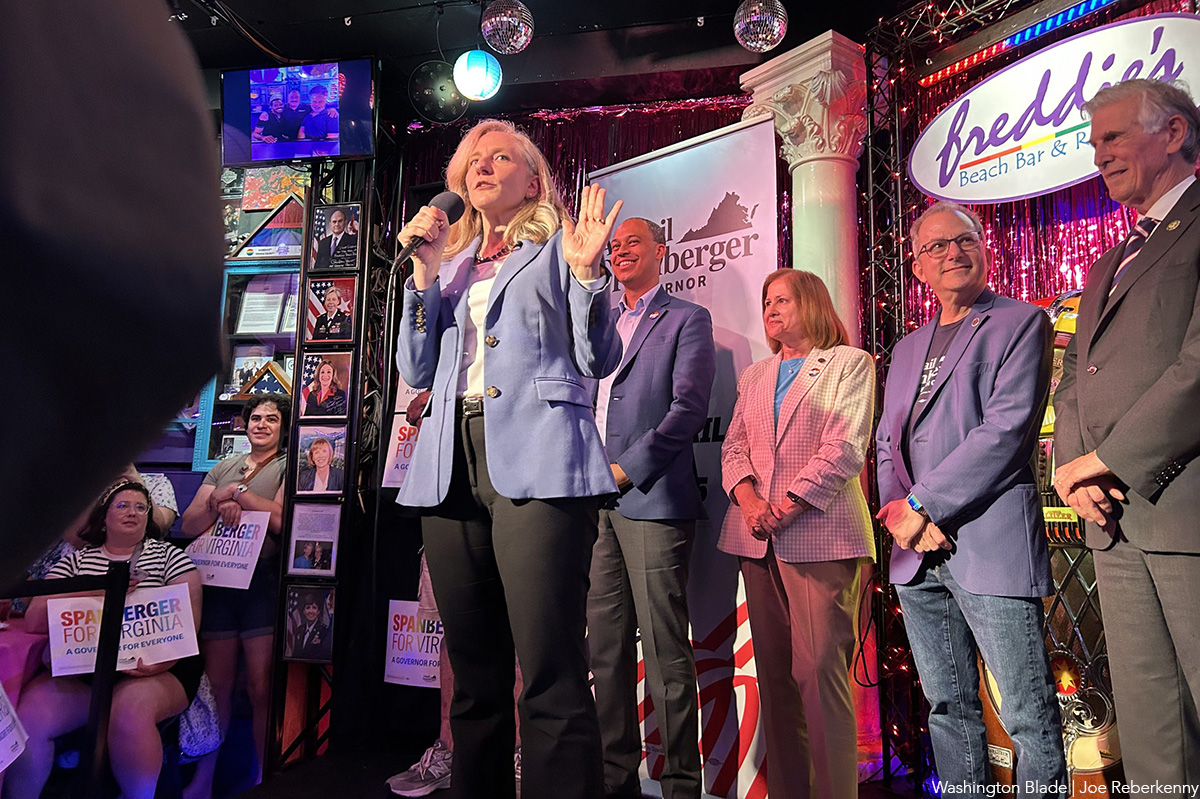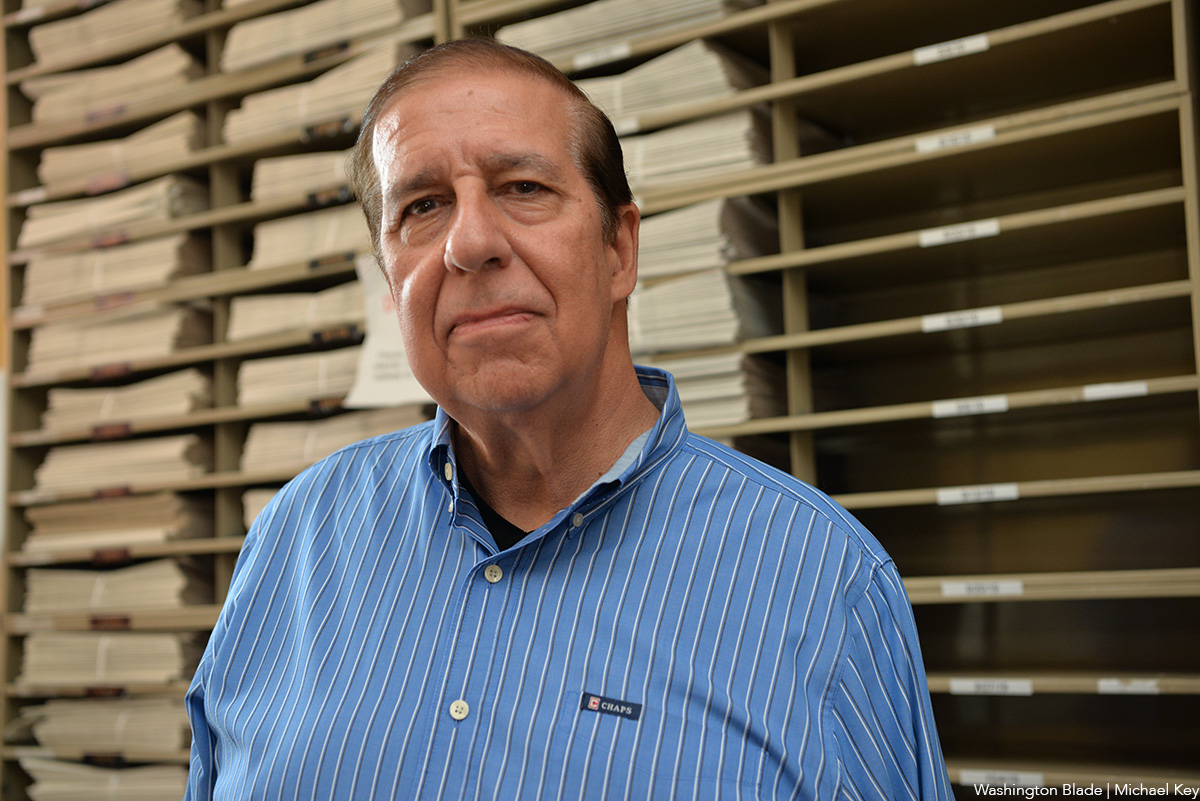Local
Spencer Perry continues moms’ tradition of activism
Son of Prop 8 plaintiffs reflects on marriage fight, stays involved at GWU


Spencer Perry is a student at George Washington University and the son of Prop 8’s plaintiffs. (Washington Blade photo by Michael Key)
Spencer Perry takes after his parents.
The 19-year-old son of the lesbian plaintiff couple in the case against California’s Proposition 8 is straight, but as a freshman at George Washington University, he’s taken leadership roles in the school’s gay-straight alliance and LGBT graduate program.
In an interview with the Washington Blade at GWU’s Duques Hall, Spencer says he would pursue LGBT activism even if his parents — Kris Perry and Sandy Stier — weren’t plaintiffs in the case that restored marriage equality to California, because of his experience in youth government programs during his adolescence.
“Sometimes I got the opportunity to travel across the country and meet others with different views on LGBT rights,” Perry says. “More often than not, I found myself even just in conversations casually, advocating for my parents and advocating for the family that we have and families just like theirs. I really felt proud of myself doing that. It was a good feeling and I wanted to keep pursuing it.”
After growing up in Berkeley, Calif., which he calls a “bubble” in terms of support for LGBT people, Spencer enrolled at GWU, where he double majors in political science and economics. Shortly after enrolling, he was elected freshman representative for Allied in Pride and was appointed as a board member of GWU’s LGBT Health Graduate Certificate Program.
He moved to D.C., where he lives on campus at Thurston Hall, at the same time his parents relocated to the area after Kris Perry accepted a job as executive director of the First Five Years Fund, a non-profit that seeks early childhood education for disadvantaged children.
Spencer says his focus at Allied in Pride is getting the culture at GWU “to be more embracing of LGBT individuals” on campus.
The next big task? Preparing for the second annual amateur drag show set for Feb. 13 called “Allied in Greek” — a collaboration between the Allied in Pride and Greek life in which members of GWU’s fraternities and sororities dress up in drag. The goal for the event, which will take place at 7 p.m. at Lisner Auditorium, is to show support for fellow LGBT students and benefit The Trevor Project, which seeks to help LGBT youth considering suicide.
Nick Gumas, who’s gay and president of Allied in Pride, praised Perry.
“Spencer has been an important part of Allied in Pride since he joined at the start of last semester,” Gumas says. “He always brings his creativity and positive energy to all of our meetings and events. It has been an absolute pleasure getting to know Spencer and I know he is going to continue to do great things in the future.”
Spencer knows firsthand the feeling of having the rights of his family taken from him. On Election Day in 2008 — the same day that President Obama was elected to office — voters in California approved Prop 8, rescinding the marriage rights that gay couples already enjoyed in the state.
“Anyone will tell you who lived in California and is part of the LGBT community, that was a very embarrassing moment because No. 1, we elected a phenomenal president, the first black president, which was a terrific feeling to be part of that, but at the same time, Proposition 8 was passed, too,” he says.
The day the California Supreme Court upheld Prop 8, Kris Perry and Stier — along with Los Angeles couple Paul Katami and Jeffrey Zarrillo — filed a lawsuit in federal court seeking to overturn Prop 8. They were represented by the legal dream team of Ted Olson and David Boies, who were hired by the then newly formed American Foundation for Equal Rights.
The lawsuit wasn’t filed before Kris Perry, his birth mother, and Stier, who became his stepmother after a previous relationship Kris Perry had with another woman, asked their four children, including Spencer and his twin brother Elliott, whether it was OK.
“I remember one day after school right before dinner around that time, Kris and Sandy sat us down,” Spencer says. “They said, ‘Listen, we’ve been approached by this group called AFER and they’re interested in pursuing a lawsuit to overturn Proposition 8 as unconstitutional. We’re very interested, but we want to make a collective decision as a family. So they asked us if Elliott and I would be OK with that.”
It didn’t take much to convince Spencer to be willing to come on board.
“Elliott and I jumped at the opportunity,” he says.
At first, Spencer says his parents “did their darndest to keep us kind of protected” from the public interest surrounding the case. But as the case proceeded through the district court, to the U.S. Ninth Circuit Court of Appeals and to the Supreme Court, and Spencer grew older and more interested in public affairs, he was able to speak out and talked to media outlets.
“I really did enjoy it,” Spencer says. “Not to be someone who’s devoted to attention, but it really was a good feeling to voice my opinion and to make sure people understand there are kids who have gay parents all across America.”
In addition to speaking at various news conferences, Spencer gave interviews to the San Francisco Chronicle, People magazine, the Los Angeles Times and New York Times, among others
One of the views against same-sex marriage that Spencer had to address — and one that he was living proof to counter — was the often-used argument that children of same-sex parents don’t fare as well as those raised by their opposite-sex biological parents.
“I’ve heard the argument a million and one times, but if anything, my gut reaction is that it’s kind of hurtful to hear that because my parents love each other, I’m worse off for it,” Spencer says. “I can’t tell you how loving and proud, and just absolutely supportive, my parents are of me. And how much better I am for them being my parents.”
After years of litigation, the case ended up before the U.S. Supreme Court, where justices ruled 5-4 that proponents of Prop 8 had no standing to defend the lawsuit, leaving in place a U.S. District Court decision from Judge Vaughn Walker that overturned the amendment on the grounds that it violated the equal protection rights of gay couples in the state.
But before that momentous decision, the justices scheduled oral arguments on March 26 to hear both sides in the case. Although Spencer wasn’t initially expecting to attend that day, an AFER board member was kind enough to give seats to allow him and Elliott to attend.
Spencer found himself sweating and uncomfortable as he observed Olson, anti-gay attorney Charles Cooper and Solicitor General Donald Verrilli makes their arguments before the justices, but for reasons other than the historic nature of the occasion.
“I caught food poisoning the night before,” Spencer says. “I never had food poisoning before, so I didn’t know what was happening, but I was just clenching the arms in my chair and sweating a little bit. I thought it was just nerves or something.”
Still, Spencer says he was inspired by what he saw, especially the comments from U.S. Associate Justice Anthony Kennedy.
“It was absolutely fantastic, especially listening to Justice Kennedy, it really touched my heart when he spoke about the kids who were involved in these cases, the children who belong to these families and feel disenfranchised by their government,” Spencer says.
Decision day came on June 28. This time Spencer wasn’t in D.C. — even though his parents were there to celebrate along with Human Rights Campaign President Chad Griffin on the steps of the Supreme Court — and instead was in North Carolina with other students involved in the debate team.
“The entire period when I was doing that, I was checking my phone, checking my Twitter, Instagram, everything I could get my hands on, every media outlet if it was going to happen,” Spencer says.
Despite the ups and downs as the case went through the courts, Spencer says the experience as a whole was positive and brought him closer to his family.
“Looking back on it, I feel immensely proud of my moms,” Spencer says. “I never felt closer to them than when I saw Kris and Sandy testifying in front of a federal judge. Even now, I still feel proud to know that they changed the lives of so many people for the better.”
Peter Rosenstein, a gay Democratic activist and friend of Spencer’s, calls him “a great kid” and says the apple doesn’t fall far from the tree in terms of the pursuit of activism shared by his parents.
“I enjoyed his response when I was first introduced to him and asked if he was gay or straight,” Rosenstein says. “He said, ‘straight, my mom’s didn’t rub off on me’ to which I responded my parents didn’t rub off on me either. I think his being at GW will be great for the school and great for all the kids that meet him.”
What should the national LGBT movement focus on next? Spencer says it should be winning state battles on marriage equality throughout the country, so when the issue returns to the Supreme Court, justices will make a favorable ruling for gay couples throughout the country.
“There’s going to be political ideology in any ruling, and there’s going to be influence in public opinion, but I think the way that public opinion has absolutely shifted in the past four years in support of marriage equality and LGBT rights, it really does speak to the fact that there’s an opportunity for a national precedent on marriage equality in the Supreme Court,” Spencer says.
District of Columbia
Imperial Court of Washington drag group has ‘dissolved’
Board president cites declining support since pandemic

The Imperial Court of Washington, a D.C.-based organization of drag performers that has raised at least $250,000 or more for local LGBTQ and non-LGBTQ charitable groups since its founding in 2010, announced on Jan. 5 that it has ended its operations by dissolving its corporate status.
In a Jan. 5 statement posted on Facebook, Robert Amos, president of the group’s board of directors, said the board voted that day to formally dissolve the organization in accordance with its bylaws.
“This decision was made after careful consideration and was based on several factors, including ongoing challenges in adhering to the bylaws, maintaining compliance with 501(c)(3) requirements, continued lack of member interest and attendance, and a lack of community involvement and support as well,” Amos said in his statement.
He told the Washington Blade in a Jan. 6 telephone interview that the group was no longer in compliance with its bylaws, which require at least six board members, when the number of board members declined to just four. He noted that the lack of compliance with its bylaws also violated the requirements of its IRS status as a nonprofit, tax-exempt 501(c) (3) organization.
According to Amos, the inability to recruit additional board members came at a time when the organization was continuing to encounter a sharp drop in support from the community since the start of the COVID pandemic around 2020 and 2021.
Amos and longtime Imperial Court of Washington member and organizer Richard Legg, who uses the drag name Destiny B. Childs, said in the years since its founding, the group’s drag show fundraising events have often been attended by 150 or more people. They said the events have been held in LGBTQ bars, including Freddie’s Beach Bar in Arlington, as well as in other venues such as theaters and ballrooms.
Among the organizations receiving financial support from Imperial Court of Washington have been SMYAL, PFLAG, Whitman-Walker Health’s Walk to End HIV, Capital Pride Alliance, the DC LGBT Community Center, and the LGBTQ Fallen Heroes Fund. Other groups receiving support included Pets with Disabilities, the Epilepsy Foundation of Washington, and Grandma’s House.
The Imperial Court of Washington’s website, which was still online as of Jan. 6, says the D.C. group has been a proud member of the International Court System, which was founded in San Francisco in 1965 as a drag performance organization that evolved into a charitable fundraising operation with dozens of affiliated “Imperial Court” groups like the one in D.C.
Amos, who uses the drag name Veronica Blake, said he has heard that Imperial Court groups in other cities including Richmond and New York City, have experienced similar drops in support and attendance in the past year or two. He said the D.C. group’s events in the latter part of 2025 attracted 12 or fewer people, a development that has prevented it from sustaining its operations financially.
He said the membership, which helped support it financially through membership dues, has declined in recent years from close to 100 to its current membership of 21.
“There’s a lot of good we have done for the groups we supported, for the charities, and the gay community here,” Amos said. “It is just sad that we’ve had to do this, mainly because of the lack of interest and everything going on in the world and the national scene.”
Virginia
LGBTQ groups to join Spanberger inaugural parade
Virginia Pride among more than 25 orgs to march in Jan.17 event

Virginia Gov.-Elect Abigail Spanberger’s inaugural committee announced on Jan. 2 that at least two LGBTQ organizations will be among more than 25 state-based organizations, including marching bands, that will participate in her inaugural parade on Jan. 17.
A statement released by the inaugural committee says the parade will take place immediately after Spanberger is sworn in as Virginia’s 75th governor and delivers her inaugural address in Richmond.
The statement lists the LGBTQ groups Virginia Pride and Diversity Richmond as two groups participating in the parade, although the two groups merged in 2021, with Virginia Pride becoming a project of Diversity Richmond. Among other things, Virginia Pride organizes Richmond’s annual LGBTQ Pride events.
“A display of the impressive talent and beauty of every corner of Virginia, our inaugural parade will be a celebration of all that makes our Commonwealth strong,” Spanberger said in the Jan. 2 statement. “I’m excited for attendees in the stands on Capitol Square and families watching together at home to see this incredible showing of Virginia pride,” she said.
James Millner, who serves as director of Virginia Pride, told the Washington Blade about 75 people are expected to join the Virginia Pride-Diversity Richmond contingent in the parade. He said among them will be members of other Virginia LGBTQ organizations.
“We’re going to invite our staff, our board, our volunteers, and our community partners to join us,” Millner said.
“We are thrilled and honored to have been invited to participate in Abigail Spanberger’s inauguration festivities,” he added. “I think this represents a marked change from the previous administration and demonstrates what she campaigned on – which is she sees the diversity of the Commonwealth as a strength that needs to be celebrated,” he said. “And we are very happy that she has invited us to represent the diversity of the commonwealth.”
Millner appeared to reflect on the sentiment of the large majority of Virginia’s LGBTQ community in its support for Democrat Spanberger over Republican Lt. Gov. Winsome Earle-Sears in the November 2025 Virginia election and the end of incumbent GOP Gov. Glenn Youngkin’s term in office on Jan. 17.
“After what we’ve been through with the Younkin administration, especially in its treatment of LGBTQ folks, especially transgender and nonconforming folks, I think we are all breathing easy and excited about what opportunities will exist in working with Abigail Spanberger,” he told the Blade.
District of Columbia
Two pioneering gay journalists to speak at Thursday event
Blade’s Chibbaro, Falls Church News-Press’s Benton talk long careers

Two local gay journalists will speak on a panel this week about their long, pioneering careers.
A celebration of the Falls Church News-Press’s Nicholas Benton and the Washington Blade’s Lou Chibbaro Jr., two trailblazing LGBTQ journalists who have spent decades reporting on the front lines of social, cultural, legal, and political change in America, will be held this Thursday, Jan. 8, at the Women’s National Democratic Club of Washington. D.C., 1526 New Hampshire Avenue, N.W., at 6 p.m., according to a statement from organizers.
The program will explore their journeys, the evolution of LGBTQ journalism, and the ongoing fight for equality and justice. Benton and Chibbaro will also examine the various factors causing many news outlets to cease print publication and their energetic efforts to continue publishing their work both in print and online.
EVENT DETAILS:
- Remarks and Q&A, in-person and via Zoom.
- 6 p.m. complimentary hors d’oeuvres and cash bar; 6:30–7:30 p.m. program followed by book signing.
- Zoom only: $10. In-person: members: $20, nonmembers: $30 plus tax.
Benton’s latest book, “Please Don’t Eat Your Children, Cult Century, and Other Essays,” will be available for purchase at the event.
Benton is a longtime local journalist and LGBTQ rights activist whose work has had a lasting impact on both community journalism and social justice. Author of the first-ever editorial in the pioneering Gay Sunshine newspaper in 1970, he is best known as the founder, owner, and editor of the Falls Church News-Press, an independent weekly newspaper he launched in 1991 and is the paper of record for the City of Falls Church, Virginia.
Chibbaro is the senior news reporter for the Washington Blade and a pioneering journalist in LGBTQ news coverage. He has reported on the LGBTQ rights movement and community continuously since 1976, first as a freelance writer and later as a staff reporter, joining the Blade in 1984.



















